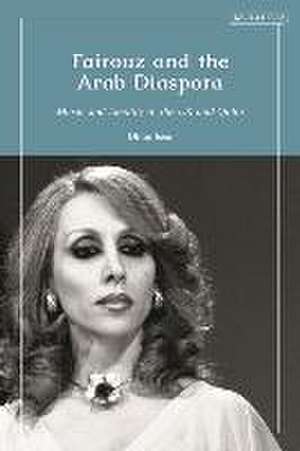Fairouz and the Arab Diaspora
Autor Dima Issaen Limba Engleză Paperback – 27 noi 2024
| Toate formatele și edițiile | Preț | Express |
|---|---|---|
| Paperback (1) | 192.51 lei 3-5 săpt. | |
| BLOOMSBURY ACADEMIC – 27 noi 2024 | 192.51 lei 3-5 săpt. | |
| Hardback (1) | 507.50 lei 6-8 săpt. | |
| Bloomsbury Publishing – 17 mai 2023 | 507.50 lei 6-8 săpt. |
Preț: 192.51 lei
Preț vechi: 250.58 lei
-23% Nou
Puncte Express: 289
Preț estimativ în valută:
36.84€ • 38.84$ • 30.67£
36.84€ • 38.84$ • 30.67£
Carte disponibilă
Livrare economică 20 decembrie 24 - 03 ianuarie 25
Preluare comenzi: 021 569.72.76
Specificații
ISBN-13: 9780755641802
ISBN-10: 0755641809
Pagini: 232
Dimensiuni: 156 x 234 x 25 mm
Greutate: 0.45 kg
Editura: BLOOMSBURY ACADEMIC
ISBN-10: 0755641809
Pagini: 232
Dimensiuni: 156 x 234 x 25 mm
Greutate: 0.45 kg
Editura: BLOOMSBURY ACADEMIC
Caracteristici
Based on ethnographic research over two years, this is the first book to examine Arab diasporic experience through the music of Fairouz, an artist of pan-Arab appeal
Notă biografică
Dima Issa is Senior Lecturer of Mass Media and Communication at the University of Balamand, Lebanon. Her research focuses on the relationship between popular media and diasporic audiences.
Cuprins
Chapter One: The Individual, the Social, the Diasporic and the Music of Fairouz - An introductionChapter Two: The Arab Diaspora in London and DohaChapter Three: Affective Identities: 'Arabness', Hybridity, and 'Intercontextual' IltizamChapter Four: Fairouz, Affective Space and the DisplacedChapter Five: Music, Migrancy, Presence and AbsenceChapter Six: Visualising an Arab Homeland, Naturalization, Mobility and 'Power Geometries'Chapter Seven: Fairouz, Time, Generational Lineage and the Mnemonic ImaginationChapter Eight: Understanding Diasporic Existence Through the Songs of Fairouz
Recenzii
Fairouz is a household name in the Arab world. Alongside Umm Kulthum of Egypt, she has been indispensable to the modern construction of the cultural and musical heritage of Arab societies. Dima Issa's study illuminates Fairouz's wide reach among the Arab diaspora, astutely analyzing her beginnings and her rise as a gifted woman amidst fraught political conditions in Lebanon. It is hard to imagine a more remarkable study than Issa's on this topic.
In this singular and sophisticated study examining the legendary Lebanese singer Fairouz and the role her music plays in the lives of her listeners, Dima Issa shows us how central Fairouz is to Arabs in the diaspora and how, paradoxically, the further away you are from Fairouz, the closer she is to you.
In 'Fairouz and the Arab Diaspora,' Dima Issa has penned an original contribution to our understanding of the connections between music, identity, and location. Lyrically evoking a family life 'filled with love, food, and Fairouz,' Issa demonstrates the centrality of the Lebanese icon to Arab identity from Doha to London. In this theoretically rich text, Fairouz emerges as an effective portal for a dizzying multitude of aesthetic predispositions and identity postures. A rich, evocative work deserving of a wide readership.
In one of the contemporary world's greatest voices, Dima Issa finds histories of home, movement, displacement, and sanctuary-- an entire philosophy of the Arab diaspora. By studying how, and why, people listen to Fairouz, whether in cars, hair salons, or cafes, Issa reminds us that music's most lasting meanings are made in the lives of its listeners.
This perceptive book beautifully illustrates how Fairouz's music shapes diasporic imaginaries across generations and spaces. As the significance of music unravels through the experiences and voices of audiences, we hear and see how diasporic identities are individual and collective, contradictory and stubborn.
In this singular and sophisticated study examining the legendary Lebanese singer Fairouz and the role her music plays in the lives of her listeners, Dima Issa shows us how central Fairouz is to Arabs in the diaspora and how, paradoxically, the further away you are from Fairouz, the closer she is to you.
In 'Fairouz and the Arab Diaspora,' Dima Issa has penned an original contribution to our understanding of the connections between music, identity, and location. Lyrically evoking a family life 'filled with love, food, and Fairouz,' Issa demonstrates the centrality of the Lebanese icon to Arab identity from Doha to London. In this theoretically rich text, Fairouz emerges as an effective portal for a dizzying multitude of aesthetic predispositions and identity postures. A rich, evocative work deserving of a wide readership.
In one of the contemporary world's greatest voices, Dima Issa finds histories of home, movement, displacement, and sanctuary-- an entire philosophy of the Arab diaspora. By studying how, and why, people listen to Fairouz, whether in cars, hair salons, or cafes, Issa reminds us that music's most lasting meanings are made in the lives of its listeners.
This perceptive book beautifully illustrates how Fairouz's music shapes diasporic imaginaries across generations and spaces. As the significance of music unravels through the experiences and voices of audiences, we hear and see how diasporic identities are individual and collective, contradictory and stubborn.
